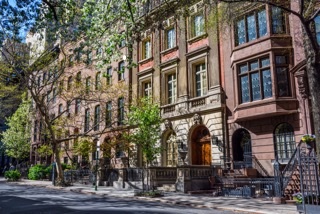If you are considering buying New York City real estate, your home search should begin with the
evaluation of your budget. You’ll want to establish realistic and honest amounts for (a) how much you can afford for a down payment, and (b) the amounts you can spend for necessary monthly expenses including your mortgage payment, real estate taxes and insurance, maintenance or common charges, utilities, and parking.
Prioritizing your needs is also an important initial step. This includes deciding how much space and what amenities (such as a doorman, gym, outdoor space, etc.) you absolutely need vs. what you want. Needs vs. wants can also be a factor in choosing the neighborhoods in which you would consider living. If you’re not sure, begin by asking the opinion of friends, relatives, and co-workers (keeping in mind the subjectivity of their comments), while also doing research online. After narrowing the possibilities, visit the neighborhoods and interact with their amenities and residents.
Once you have established what you think you can afford and where you want to be, and that purchasing a home is a realistic possibility, obtain a loan pre-approval, and find a real estate attorney familiar with New York property laws and rights.
Condominiums vs. Co-ops

Classified as “real property,” a condo is similar to owning a house in that the buyer receives a deed and becomes the title owner of the property rather than a shareholder in the building, as is the case with a co-op. The approval process is usually easier than with a co-op, and financing, leasing rules, and regulations are generally much more liberal. In addition to paying real estate taxes on a condo, there are also common charges. As owner, you can typically rent your condo to anyone you deem acceptable, although most condo boards have some rules and processes in place. As a result of having less restrictive rules and greater flexibility in condo ownership versus co-ops, condominiums in NYC are typically priced 20% to 30% higher than comparable co-op apartments. Nevertheless, they continue to be desirable with local and international real estate investors.

On the other hand, a co-op is an apartment building owned by a corporation, with each tenant in the building issued shares associated with his or her apartment, and holding a proprietary lease on the specific unit. Co-op shareholders are subject to rules and restrictions set forth in the by-laws of the corporation, as well as those contained in their proprietary lease. Any proposed sub-leasing, alteration, or renovation of the unit must be approved by the co-op’s board of directors elected by the building’s tenants in accordance with formal processes put in place by the board. As a result of the very essence of cooperative ownership and living in a co-op, most co-ops have very strict rules on subleasing and some prohibit it altogether. A co-op owner will pay a monthly maintenance fee which will include his or her proportionate share of costs for real estate taxes, maintenance, and management of the building. Co-ops represent over 75% of residential property in New York City.
The Process (2-4 months)
1. Obtain mortgage pre-approval. This usually takes 1-3 days and will let you know how much you can spend. Although each building has its own requirements, condominiums typically require at least 10% down while a minimum of 20% down is typical for co-ops.
2. Your home search. This phase of your adventure into buying New York real estate can take from 2 weeks to 2 months or more, but can vary considerably, of course, depending on your needs and wants, and available inventory. If you are an “average” buyer, you’ll see 7-20 units during the course of your search.
3. Negotiating the purchase price. Remember that everything is negotiable and that this task will probably take 1-7 days. However, in a strong market, buyers must be prepared to act swiftly for fear of losing the deal to competing bidders. The agents at Spark Realty strongly recommend having a REBNY form financial statement prepared in advance. They are typically required to be submitted with an offer as they show sellers you have the financial ability to close.
 4. Signing the contract. Having an attorney experienced in New York real estate is strongly advised for this. Expect the process to take about a week. The attorney for the seller will draw up the contract and forward it to the your attorney who will then do “due diligence,” which typically includes reviewing the board minutes, offering plan, and financial statements of the building. Subsequent to everything being agreeable to both parties, you will sign the contract and make the down payment, typically 10% of the purchase price, which is held by to the seller’s attorney as escrow agent. The contract is considered binding only after it has been signed by both the buyer and seller, and the downpayment has been delivered to the escrow agent.
4. Signing the contract. Having an attorney experienced in New York real estate is strongly advised for this. Expect the process to take about a week. The attorney for the seller will draw up the contract and forward it to the your attorney who will then do “due diligence,” which typically includes reviewing the board minutes, offering plan, and financial statements of the building. Subsequent to everything being agreeable to both parties, you will sign the contract and make the down payment, typically 10% of the purchase price, which is held by to the seller’s attorney as escrow agent. The contract is considered binding only after it has been signed by both the buyer and seller, and the downpayment has been delivered to the escrow agent.
5. Apply for a mortgage.If the property will be financed, it usually takes approximately 30 days to apply for and receive the financial institution’s Commitment Letter. There must be an executed contract for mortgage applications to be processed. The Commitment Letter is usually the final item needed to complete a board package or condominium application.
6. Complete a board package or condominium application. This process can take from 1 to 2 weeks, or as much as 4 to 6 weeks depending on the board’s and its managing agent’s policies and practices. Co-ops require extensive information and board approval of the purchaser prior to allowing the sale to proceed to closing. Supporting documentation typically includes proof of employment and salary, personal and business references, 3 years of tax returns, credit history, and more. One of benefits of purchasing a condo is that the purchase application and process is considerably streamlined and less of a burden from that of a co-op. But having an experienced and diligent broker put the co-op board package together with you is invaluable.
7. Submit the board package or condo application.The managing agent could take up to 30 days to review the package or application once it is completed by the buyer and its agent. If the property is a co-op, the managing agent will forward it to the building’s board of directors which will then review it and decide whether they would like to meet with the potential purchaser.
8. The co-op board interview. Each board is different, with its own set of rules and its own meeting time, which is typically once a month and in the evening on a weeknight. An interview will take around 30 minutes to an hour, but doesn’t guarantee board approval.
9. Board approval. Within a day, to as much as 2 weeks of the meeting, the managing agent will notify the buyer’s broker about the board’s decision.
10. Schedule the closing. If the property is a co-op, subsequent to its board’s approval, a closing will be scheduled by the managing agent within 1 to 2 weeks. Attorneys for the buyer and seller will coordinate with the financial institution regarding dates and times.


